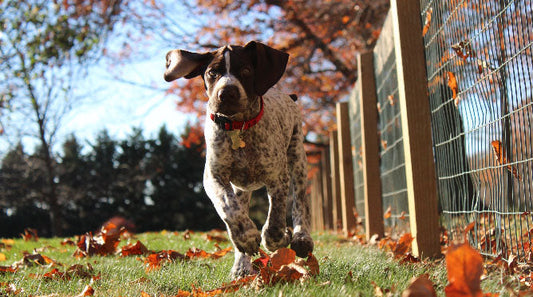The weather is warming up and you don't want to let pests take down your pup! These tips will help you prevent fleas and ticks from slowing down your springtime fun and help you understand what to do if your dog ends up picking up one (or more) along the way.
Spring is a time for adventures! Going to new parks, on long-distance road trips and checking out new places that were off limited during the cold and dark winter.
As the air heats up, fleas and ticks will start popping up all over the place. Prevention, as recommended by the American Kennel Club, is the best way to protect your dog from these critters. You can even use your LINK AKC Smart Collar to remind yourself when to administer the next round of flea and tick prevention medications with the custom Vet records alert feature.
To better prepare yourself, you can learn how to effectively spot fleas and ticks and learn what to do if they happen to hop on your pup.
Identify the Pest
Fleas are most commonly found on a dog's belly, the base of the tail and the head. When you're giving them some snuggles at night after a fun day of adventure, do a quick check in these areas, specifically. Small, dark "grains of sand" (or "flea dirt") are a good indicator of an infection. Flea eggs, dermatitis, excessive scratching and hair loss are other indicators. For a full list of symptoms, visit PetCareRX here.
Ticks are the size of a pinpoint before they fill with blood, which is when most are found on dogs and humans. They're most often found on the back or head, so pay special attention to those areas after a day of play.
Treatment
The best way to keep your dog safe is to start a prevention regime before you go on vacation and stay on top of the doses all year long. If your pet does happen to get fleas or ticks while unprotected, there are several common treatment methods and you should get them to your Vet right away.
Anything Else I Should Look Out For?
Mosquitos bite dogs too! Yes, your furry friend is just as susceptible to the itchy, red bites that plague humans all summer long. They're also at risk for the same diseases carried by mosquitos so it is important to do all you can to keep clear of areas that could breed mosquitos. Dogs are also at risk of contracting Heartworms from an infected mosquito. While more prevalent in the South, mosquitos can infect dogs all over the country. It is important to use Heartworm prevention as well as ask your vet to test your pup if you think they may have been exposed.
Pest World recommends asking your Vet if commonly used pest repellents are safe for your dog and, if so, using them within reason.
Have fun and make sure to tag us in all your springtime adventures!





